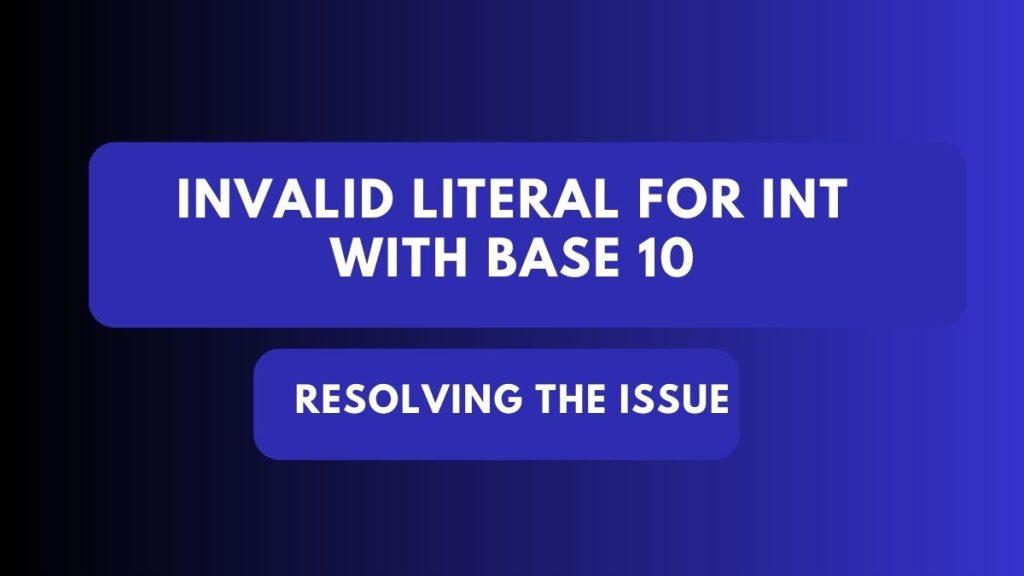Even for seasoned programmers, making mistakes is a typical occurrence in the world of programming. The “invalid literal for int with base 10” issue is one example of a frequent error, particularly in Python programming. Beginners might find this error notice confusing, but worry not—we’ll explain what it means, why it occurs, and how to diagnose and repair it.
Invalid Literal for int with Base 10: Explained
You can encounter the error message “invalid literal for int with base 10” when dealing with computer languages like Python. This issue often happens when you try to use the int() function to convert a string to an integer, but the string cannot be understood as a legitimate integer.
Reasons for the Error
The error message “invalid literal for int with base 10” can be caused by various scenarios:
- Non-Numeric Characters: The int() function cannot convert a string to an integer if it contains letters or other non-numeric characters.
- Whitespace or Formatting Issues: This issue can also be brought about by the presence of extra spaces or formatting characters in the string, which prevent the string from being recognised as an acceptable integer.
- Empty Strings: This error occurs because an empty string has no numeric value and cannot be converted to an integer.
- Base Mismatch: The base parameter of the int() function provides the numerical base used to interpret the string. This issue may result from wrong base setting.
Resolving the Error
To address the “invalid literal for int with base 10 error, follow these steps:
- Check String Content: Check the string that you are attempting to convert. Make sure there are no extra spaces, formatting, or non-numeric characters in it, just numerical characters.
- Empty String Handling: Add a condition to check for emptiness before attempting the conversion if you think the string might be empty.
- Verify Base Parameter: Make that the base parameter in the int() function corresponds to the intended base of the string if you’re using a base other than 10.
- Use Exception Handling: Use a try-except block to stop the programmed from crashing when this mistake occurs. By doing this, you may identify the issue and gently handle it without interfering with how the programmed is running.
Conclusion
The “invalid literal for int with base 10” issue is a good example of a programming error that is unavoidable when learning to code. You can confidently get past this obstacle by comprehending the reasons for this problem and putting the suggested fixes into practice. To keep your programmer going smoothly, keep in mind to check the content of your strings, deal with empty strings, confirm the base parameter, and employ exception handling. The following time you run into this problem, you’ll be prepared to address it head-on.
FAQs
What is the main cause of the “invalid literal for int with base 10” error?
The main reason for this error is trying to use the int() function to convert a string to an integer when the string has non-numeric characters, excessive spaces, or formatting errors.
How can I fix the “invalid literal for int with base 10” error?
Make sure the string you’re attempting to convert is not empty, only contains numeric characters, and doesn’t contain any extra spaces. Additionally, make sure the string’s intended base corresponds to the base parameter of the int() function.
Can whitespace within the string trigger this error?
Yes, the int() function may perceive a string as invalid if it contains extra spaces or formatting characters, resulting in this error.
Is there a way to prevent my program from crashing when this error occurs?
Absolutely. The “invalid literals for int with base 10 mistake can be caught and elegantly handled with a try-except block, preventing a sudden programmer crash.
What’s the purpose of the base parameter in the int() function?
The string will be interpreted using a base parameter that defines the numerical base. It is initially set to 10, which is a decimal number. To read the string as an integer in a different base, such as binary or hexadecimal, you can alter the code.
Can I convert an empty string to an integer?
No, attempting to convert an empty string to an integer will result in the “invalid literal for int with base 10” error, as there’s no numeric value to convert.







